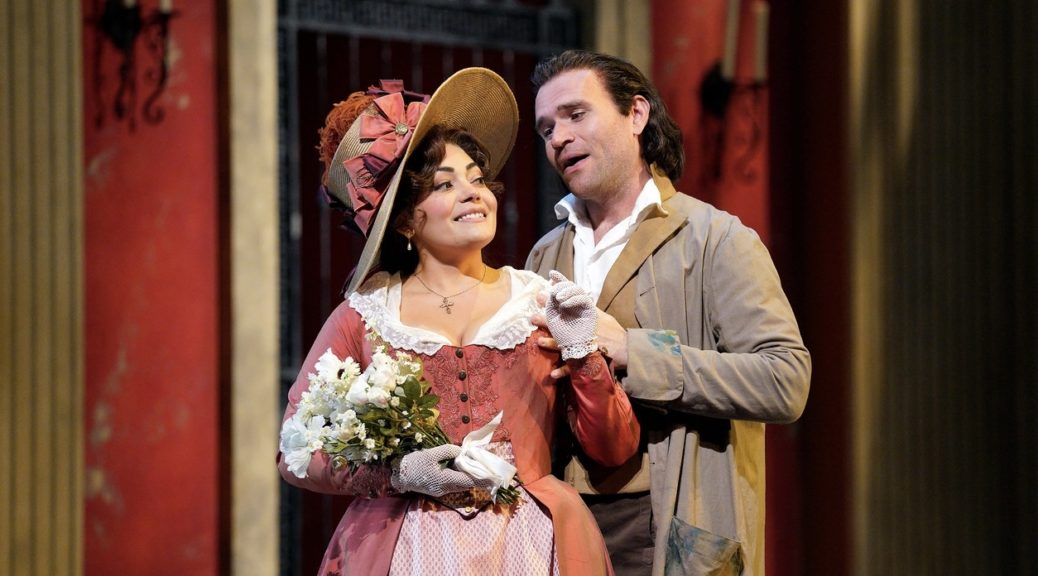
San Francisco’s, and the tenor’s, love for Tosca
I dearly love this “shabby little shocker,” as the great musicologist Joseph Kerman once termed it, surfeited as it is with melodrama.
The opera “Tosca” embodies the most greed, real-world corruption, duplicity, betrayal, revolutionary activism, hypocrisy and sheer sexual desire of any of Puccini’s operas, all set in familiar sites of Rome, adding up to a stunning social critique of the composer’s homeland. It shows this very establishment composer as a political activist, protester and reformer for once.
Naturally, no opera has ever had a greater hold on San Francisco, which staged it as the very first work in the War Memorial Opera House in 1932 and then in 41 different seasons since. What better work to reopen on-stage production after a galling 20-month pandemic shutdown?
And what about the intriguing murder trial that would have followed, had Tosca not killed herself by jumping off a Rome parapet? Tosca was subjected to sexual submission to the evil Scarpia if she was to save her imprisoned lover/revolutionary. Instead, she grabbed a nearby dagger and dispatched Scarpia in her supreme act of public service.
Murder? Manslaughter? Justifiable homicide? Good case study for law students, especially given Scarpia’s astute evidence-gathering to entrap both male revolutionaries on the lam. This ranks with a mere handful of other works, like Janacek’s “The Makropulos Affair,” as fodder for young attorneys or detectives.
But as melodramatic opera, this one really works with its entirely American cast. The S.F. Opera’s 2018 production propels it along with stirring leads as the lovers Tosca and Cavaradossi. In her first Tosca, Chicagoan Ailyn Perez was vocally compelling, with an upper octave stronger than the lower one. As the coquettish diva, she played the insecure jealousy card in act one very well, while also carrying out the most difficult pantomime of all as the tremulous murderer preparing a tomb-like scene around the cadaver. Tenor Michael Fabbiano, who had never ventured Cavaradossi before this summer, was heroic and convincing as the maligned prisoner, bringing down the house with his solo of resignation “E lucevan le stelle” prior to the firing squad. Clearly, a major talent to watch and hear in the future. The love duets of the two were to melt over.
Scarpia newcomer baritone Alfred Walker was still feeling his way into the role, both as actor and as singer with heft. Others of note: Soloman Howard as Angelotti; Dale Travis, the SFO’s most prevalent character bit player since Colin Harvey, as Sacristan; and my favorite hiss-the-villain in all Puccini, Spoletta, taking huge nightly tumbles, courtesy of the irascible Scarpia, played by Joel Sorensen.
When heard Aug. 27, this was a promising start for the new feminine SFO Music Director Eun Sun Kim and a great finale season for choral Director Ian Richardson if the robust church procession ending Act One was any indication (He retires in December). Director Shawna Lucey kept the movement going, literally; whenever things slowed, extras were hopping about on stage. Even her firing squad appeared made up of veteran troops.
MUSIC NOTES—The SFO is authorized to sell out the whole house, if all are masked and vaccinated, because the entire cast itself is fully vaccinated, a company representative explained. More future standing ovations at the S.F. OPERA? If so, ascribe it in part to the new chairs installed all over during the long pandemic. The old ones, mostly from 1932, sank down, down, down, till you went out of sight far below, very often with unsettling squeaks as downward accompaniment……..
PUCCINI’S OPERA ‘TOSCA,’ in Italian, with supertitles, by San Francisco Opera, continuing through Sept. 5. Opera House, S.F. For info: (415) 864-3330 or go online. www.sfopera.com